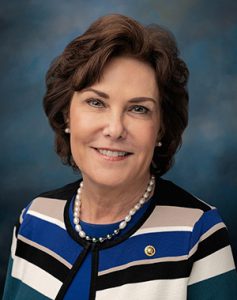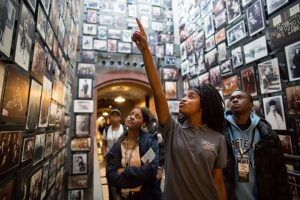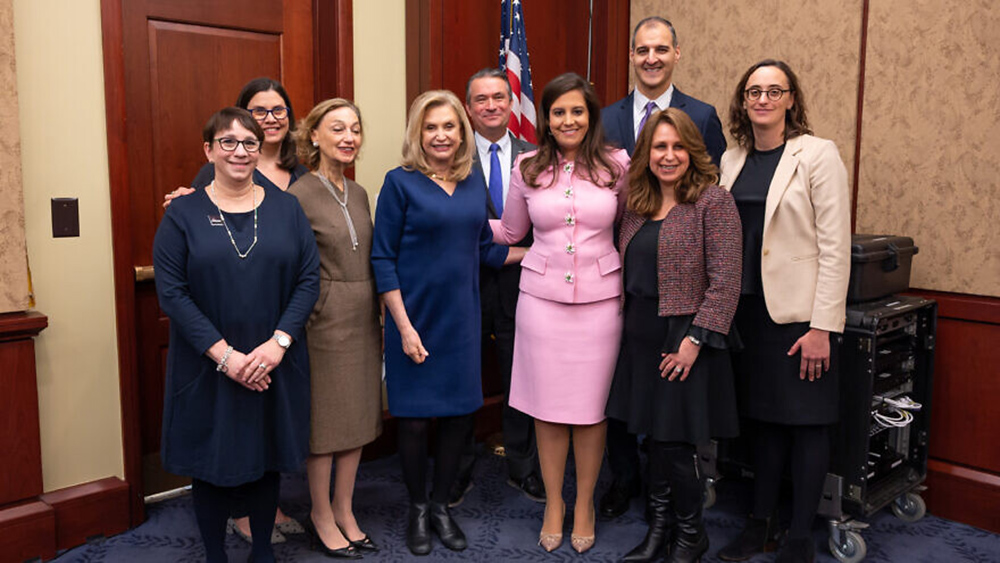By “giving educators the tools they need to teach about the Holocaust and the dangers of anti-Semitism and hate, I believe we can stop anti-Semitism before it starts,” said Rep. Carolyn Maloney (D-N.Y.), who introduced the newly signed Never Again Education Act in the U.S. House of Representatives.
By: Jackson Richman
Amid the rise in anti-Semitism in the United States and abroad, President Trump signed the Never Again Education Act into law on Friday as part of Jewish American Heritage Month, one month after the 75th anniversary of the defeat of Nazi Germany.
The story behind the passage of this landmark legislation is one that transcended the usual partisan politics of Washington, D.C., bringing together Jewish and Christian groups, and liberal and conservative lawmakers in a rare display of bipartisanship to have a measurable impact on awareness and understanding of the ramifications of the Holocaust.
“Unfortunately, we have an seen a significant spike in anti-Semitic attacks and vandalism over the past few years, and these undeniably disturbing events spurred action,” said Rep. Carolyn Maloney (D-N.Y.), who introduced the bill in the House and who has waged a multi-decade effort to pass such legislation.
Citing an Anti-Defamation League report released this month that showed that 2019 consisted of the highest number of anti-Semitic incidents in four decades, she said that “both sides of the aisle saw how urgent this is, and this bill was bipartisan from the start.”
The new law seeks to expand the U.S. Holocaust Memorial Museum’s education programming to teachers nationwide, requiring the museum to develop and disseminate resources to improve awareness and understanding of the Holocaust and its lessons.
There will be $2 million allocated annually for this year and each of over the next four years to the Holocaust Education Assistance Program Fund, administered by the USHMM’s governing body, the U.S. Holocaust Memorial Council. Private donations for the fund would also be permitted.
Maloney, the 13-term lawmaker who represents New York’s 12th Congressional District, noted her experience as a former educator played a role in pushing for the bill whereby “education is a key tool in fighting all forms of hate and bigotry, and by reaching children in the classroom, we can make sure they learn understanding and acceptance rather than discrimination.”
Anti-Semitism must not only be punished but also prevented, she said. By “giving educators the tools they need to teach about the Holocaust and the dangers of anti-Semitism and hate, I believe we can stop anti-Semitism before it starts,” said Maloney.
‘Support was built inch by inch’
The bill had the support of “more than 50 national organizations and more than 250 local partners,” according to Maloney, who credited the Anti-Defamation League (ADL), Hadassah and the Jewish Federations of North America as “instrumental” in getting the legislation passed.

Hadassah CEO and executive director Janice Weinman told JNS that she attended the New York Congressional Breakfast hosted by the New York Jewish Community Relations Council in early 2018.
“I heard Congresswoman Carolyn Maloney speak about her nearly 20-year fight to strengthen Holocaust education, and I knew this was the prescription America needed to guarantee the promise of ‘Never Again,’ ” said Weinman. “And I knew it was right for Hadassah to lead the effort because we are a Zionist organization with a large national membership that believes in the power of information and education to change the world.”
“Our national president, volunteers around the country and I talked about Never Again everywhere we went for the next year-and-a-half,” she continued. “And everyone was energized by the possibility that this bill could one day become the law of the land if we fought hard enough. And fight we did.”
Hadassah director of government relations Karen Barall told JNS that Hadassah appealed to the organization’s 300,000 members and other Jewish groups.
“We started to invite representatives from other large organizations to meetings Hadassah was arranging on Capitol Hill, and our first targets were the 55 co-sponsors from the previous Congress,” she said. “Support was built inch by inch, one office at a time, and was supplemented by a grassroots effort.”
“Before and after meetings, Hadassah chapters from the representative’s district would organize to contact their offices expressing their support for the bill. Their phone calls, emails and social-media posts certainly helped to solidify support. It took more than a year to reach 300 co-sponsors, and Hadassah engaged nearly all of them one way or another.”
Ultimately, the bill had 302 co-sponsors in the Democratic-led House—205 Democrats and 97 Republicans.

While garnering support in the House, Hadassah recruited Sen. Jacky Rosen (D-Nev.), who was very responsive to our request from the start” and, meeting with Republican senators, got a receptive audience in Sen. Kevin Cramer (R-N.D.).
“North Dakota does not have a large Jewish population, but Senator Cramer didn’t see this as a Jewish issue,” said Weinman. “He saw this as an American issue.”
Rosen and Cramer were joined by Sens. Marco Rubio (R-Fla.) and Richard Blumenthal (D-Conn.).
Rosen told JNS that the Senate vote happened after “significantly increasing the number of co-sponsors of the bipartisan Senate bill and laying the groundwork for the House bill to clear committee and receive a vote from the full Senate.”
The Senate version was slightly different from the U.S. House of Representatives one, which the Senate ultimately passed, in that the former had the U.S. Department of Education—and not the USHMM—oversee the expansion of Holocaust education in the United States.
Fulfilling the promise of ‘Never Again’
As to Rosen being the leading sponsor of the bill, she pointed to her time when she was president of Congregation Ner Tamid in Nevada, where she “heard the stories of so many Holocaust survivors, stories of resilience in the face of certain death, stories of loss as so many were taken from us.”
After first being elected to Congress in 2017, first as a congresswoman from Nevada’s 3rd Congressional District, “I asked myself, what can I do as a legislator to fulfill the promise of the words ‘Never Again’ and ensure that they mean Never Again for anyone? I truly believe that education is the most powerful tool we have in the fight against hate and bigotry.”
Other groups that lobbied for the bill—an effort that included being in contact with congressional offices—included Christians United for Israel (CUFI), the American Jewish Congress (AJCongress), the Simon Wiesenthal Center (SWC), the Jewish Federations of North America (JFNA) and the Republican Jewish Coalition (RJC).
JFNA worked “closely with Jewish communal agencies to connect with Holocaust survivors and encourage them to sign on to a letter in support of the bill. This grassroots effort collected more than 1,800 signatures from survivors in 38 states—350 community groups from every single state helped galvanize political support,” JFNA spokesperson Rebecca Dinar told JNS.
For example, in Southeast Florida’s Broward County, which is “home to one of the largest concentrations of Holocaust survivors,” Evan Goldman, vice president for community planning and government relations at the Jewish Federation of Broward County, “spearheaded the local effort to engage survivors in signing the online letter” and “emphasized the importance of collaboration in making it happen,” according to Dinar.
In Chicago, where there’s a large community of Holocaust survivors, Yonit Hoffman, director of Holocaust Community Services at CJE SeniorLife—a Federation-funded agency that serves 1,700 survivors on a regular basis—led the effort to garner 452 signatures onto the letter.
“We do lots of education, training and advocacy around their stories, which are less heard and less represented in museums and other educational settings,” she told JFNA for a story on their website.
The RJC’s legislative affairs committee “wrote to every Republican in Congress urging them to co-sponsor the bill,” the organization’s spokesperson, Neil Strauss, told JNS.
“Once the House passed its version of the bill, we began visiting Republican Senate offices, usually joined by colleagues from Hadassah and other groups supporting the bill, but we were forced to shift to most advocacy via email” due to the coronavirus pandemic making in-person meetings “impossible,” said Strauss.

The RJC put such an emphasis on the importance of the bill that the organization even withdrew its support for the four House Republicans who voted against it.
Reps. Jodey Arrington (R-Texas), Thomas Massie (R-Ky.), Tom Rice (R-S.C.) and Ralph Norman (R-S.C.) cited conservative dogma on spending and the need to have small-sized government.
In response to Norman and Arrington, RJC executive director Matt Brooks told Jewish Insider that “there comes a time when you have to take votes that go beyond process. And, I think, especially now with this time of rising anti-Semitism in the U.S. and around the world, the symbolism of this and the importance of the government standing up and showing its support for Holocaust education outweighs any process concerns.”
Brooks noted that others in the Republican caucus may have had similar misgivings or concerns about this process, but “they did the right thing, and looked beyond that to stand up against anti-Semitism and to stand with the Jewish community. So we remain disappointed in their votes. We think that they voted absolutely the wrong way on that, no matter how they want to justify it.”
At the end of the day, said Brooks, “we don’t think that this vote is a reflection of their views on anti-Semitism, but it makes it so that we will not be supporting any of those individuals going forward.”
The Anti-Defamation League, in addition to its lobbying efforts, had an action alert on its website in order to allow people to better engage with members of Congress about the matter, ADL CEO and national director Jonathan Greenblatt told JNS.
Meanwhile, “AJCongress has always supported legislation promoting Holocaust education,” Akri Cipa, a policy analyst at the organization, told JNS.
Cipa cited a Pew Research study in January that only “strengthened” his organization’s “conviction” over the need for the Never Again Education Act.
The study showed that less than half of Americans, some 45 percent, know that 6 million Jews perished in the Holocaust, while 29 percent weren’t sure or had no answer. (Simultaneously, 69 percent of respondents correctly said that the Holocaust was between the years 1930 and 1950, while 63 percent of respondents correctly defined the Nazi-created ghettos as “parts of town where Jews were forced to live.”)
(JNS.org)




